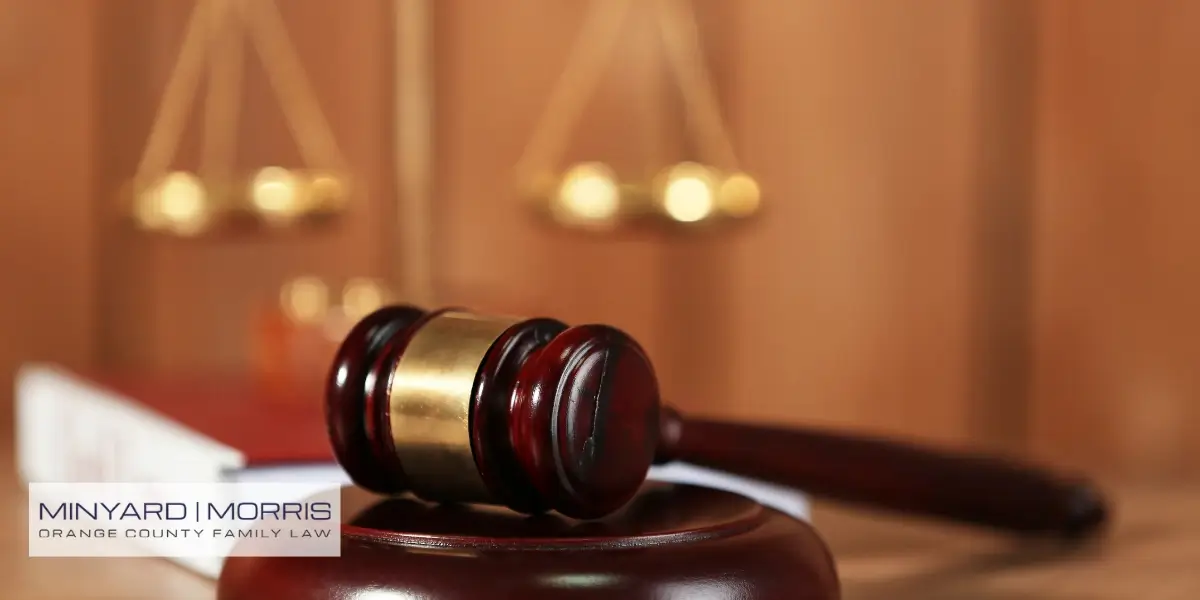|
|
Last
Modified on
Jul 17, 2025
Divorce cases are rarely simple, but a trial can add even more complexity and unique challenges. These will require preparation and an understanding of what to expect in an Orange County divorce trial. As you gather documents and schedule time for your court appearance, a divorce attorney can guide you through local procedures and protect your interests throughout the case.
What Happens During a Divorce Trial?
While the vast majority of divorce cases settle before trial, spouses can rely on the courts to resolve areas of disagreement related to child custody, property division, or spousal support. A divorce trial is a formal legal process where both parties present evidence and call witnesses before a judge just like any other trial.
Each side must follow strict rules and procedures. California does not allow jury trials for family law cases. Instead, a judge hears the evidence presented before making a ruling, which is based on the Orange County divorce laws.
The pretrial process can take months or much longer before the actual trial begins. On the day of the trial, both attorneys present opening statements, followed by witness testimony, cross-examination and a closing argument. Outside consultants, court investigators, and other parties may be called in to testify. Once all evidence is presented, the judge reviews the facts and issues a ruling.
Understanding Divorce Trial Statistics in Orange County
Divorce cases in California rarely reach the courtroom. According to the 2024 Judicial Council Court Statistics Report, fewer than 1% of civil cases, including family law, are resolved through trial. The vast majority settle beforehand, often with negotiation or court-ordered mediation.
In 2022, California’s divorce rate was 17.77 per 1,000 married women. In Orange County, 6,340 new child support cases were opened in Fiscal Year 2023–24. These numbers show how often family law disputes arise, even after a divorce is finalized.
In communities like Irvine, Fullerton, and Huntington Beach, high-conflict custody, support, and property issues often push cases toward litigation. Divorce trials in Orange County are heard at the Lamoreaux Justice Center in the City of Orange, the county’s primary family law courthouse and the Central Justice Superior Court in Santa Ana.
Should I Hire a Divorce Lawyer to Prepare for My Divorce Trial?
The decision to hire a divorce lawyer can be critical for helping you prepare for trial. An attorney brings years or decades of experience in handling divorce cases and securing favorable outcomes. With legal representation, you’ll know what to expect during a trial and how to testify in court.
During the trial, an attorney handles cross-examinations and calls out violations of court procedures by opposing counsel. When your property or parental rights are at risk, securing the right legal representation can be critical for shaping the outcome of your divorce trial.

FAQs
Q: What Questions Are Typically Asked During a Divorce Trial?
A: In a divorce trial, you may be asked about your finances, parenting history, relationship timeline, and any disputes over property. Witnesses called by your family law attorney or your spouse’s lawyer may also testify.
Both parties are expected to answer questions under oath. The judge uses this testimony to make decisions about support, custody, and property division matters. Preparation can improve how effectively your side presents evidence and legal arguments.
Q: What Statements Should Be Avoided During a Divorce Hearing?
A: During a divorce hearing, it is advisable to avoid making emotional outbursts or unsupported claims. Although a divorce can be a highly emotional period in your life, it is wise to avoid saying anything disrespectful about your spouse. Doing so could reflect poorly on you. Stick to facts, and speak calmly. Focus on the relevant issues at hand and follow your attorney’s advice during all court proceedings. Don’t interrupt the judge and only speak when directed to.
Q: What Happens at a Pretrial Divorce Hearing in Orange County?
A: A pretrial divorce hearing helps the court understand which issues are currently unresolved. The judge uses this time to gain updates about the case, and they may make recommendations for resolving it. These hearings narrow the scope of the trial so a divorce can be settled without undue delays. Judges often use it to manage courtroom time and determine if any agreements can be reached.
Q: Who Attends a Divorce Trial in Orange County?
A: Divorce trials usually involve both spouses, their attorneys, the judge, and, often, witnesses or third-party professionals. The courtroom is open to the public unless the judge orders privacy for sensitive matters. During the course of the trial, testimony is given under oath, and both sides present evidence and make legal arguments backing their claims. Court staff and legal clerks may also be present.
Q: How Should You Prepare for a Divorce Trial in California?
A: You can prepare for a trial by working with your family law attorney to review documents and discuss what could happen during the trial. Your lawyer can help you prepare for testifying by reminding you of the court rules governing testimony and what types of questions you may be asked. This can be a busy time for a family law attorney as they review the case, organize documents, and prepare to examine or cross-examine witnesses.
Contact a Dedicated Orange County Divorce Lawyer
Although trials are a last resort for resolving lingering issues tied to a divorce, they can provide favorable outcomes that protect your parental and property rights through a court order. The key to winning any trial lies in careful and methodical preparation. When spouses in Orange County go to trial at family court, they know they can rely on the legal services of Minyard Morris to deliver the results they need. Our efforts enable our clients to move forward in their lives with confidence.
When you work with our team of trial-ready family law attorneys, you benefit from a personalized approach to legal representation and our collective 350-plus years of combined legal experience in Orange County divorce laws. Our weekly firmwide strategy meetings enable our clients to benefit from our collective years of experience, in and out of the courtroom. Go to court with the high-quality legal support you need. Contact our office today to learn how we can help.






